Cluttering - A Parents Perspective
 |
About the presenter Jonathan Wong is chair of the "Family Issues Committee" of the International Cluttering Association. He writes, "I'm a parent with a 15 year old son who clutters. For the last 10 years, we have struggled with the diagnosis and resources for my son's language delays. Hopefully, our story will help other parents and also help spread awareness for cluttering." |
(NOTE: The following paper is a summary of a presentation made by Jonathan Wong. A few of the PowerPoint slides are incorporated into this paper Judy Kuster.)
Cluttering - A Parent's Perspective
by Jonathan Wong
from California, USA
I am the father of a 14 year old boy who clutters. I would like to share a bit about my experiences dealing with my son's cluttering, and hopefully spread awareness to other parents and to speech-language pathologists by sharing our experience in getting a diagnosis and then treatment.
We have been trying to identify my son's speech issues since the age of 3 when we started to notice a delay in his language skills. Of course, the typical response from most doctors was "He will grow out of it." Well, for the next 5 years that was all we heard. It wasn't until he was about 7 years of age when the doctors started more aggressive attempts at a diagnosis.
Now, at the age of 14.5, Jon presents an undefined speech intelligibility disorder and a cluttering disorder - both a speech disorders and a fluency disorder. These problems are further exacerbated by underlying linguistic and cognitive disturbances. Trying to find resources, services and resolution s have been a long and frustrating process. We have gone through dozens of doctors and every possible type of testing from hearing, ADD, XY Chromosome, and more! He even had electrodes attached to his head for a day of monitoring brain wave.
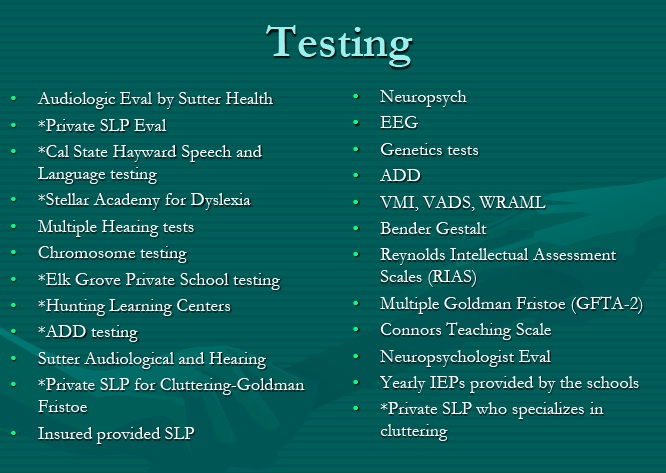
We spent a lot of time and money getting many different diagnoses such as ADD and stuttering. All of it seemed like a wasted effort. It was very frustrating!
When our son was 12 and in the 5th grade, we finally got a break. After working with our son for 2 years, his school speech therapist pondered the idea of cluttering. This was a major relief. Knowing is half the battle. We had spent the previous ten years full of worry because of the lack of awareness about cluttering in the medical world. I believe if we had know sooner, my son would be much better off today. He would have gotten the needed support much sooner. Once again, I blame this on the "Lack of awareness about cluttering in the medical field."
Finally there was a "monkey off our backs." We breathed a huge sigh of relief. For the first time we actually felt like we could do something to help Jon.
Now it was time to fight the second half of the battle - time to arm ourselves with information. I do a lot of "internet shopping" and a lot of homework before I invest in something, whether it's a half million dollar piece of networking equipment or an electric skateboard. I consider myself pretty savvy when it comes to searching the Internet. But searching for cluttering resources was one of the most difficult and time consuming processes that I had ever encountered.
The National Stuttering Association was helpful and became a launching point for my research to find more specific resources about cluttering. With the work of the International Cluttering Association, information has become more readily available than it was a few years ago.
Once we knew what we were dealing with, we got a professional evaluation of cluttering completed. Half the battle was getting that diagnosis. It took three months of fighting with the insurance company before we decided just to pay the $400 our of pocket for that evaluation. But now that we had an official diagnosis, it was time to get some sort of treatment.
Due to the high costs of tests and therapy, our first attempts were kept within the boundaries of the insurance company, only because we thought we had good health insurance. We spent about a year trying to get services paid through our insurance. Every single step of the way we were fighting tooth and nail. Trying to get help for cluttering really turned out to be a nightmare with insurance companies. Being restricted to in-plan doctors was a hindrance in finding appropriate testing and therapy specifically for cluttering.
Having double coverage made things much worse as the insurance companies would try to make the other insurance pay the fees. It took a month to get anything approved. It took about a couple of months to get a single test done. Everything regarding "cluttering" was considered "out of network." The insurance companies do not consider cluttering a biological disorder. Until cluttering is well defined, there will be many such hurdles dealing with the insurance companies.
I've made dozens of inquiries to various speech-language pathologists (SLPs). Most we have encountered have heard of cluttering, but have not really worked with any PWC. Some SLP's have never even of cluttering. One even told me that I was confused and meant to say stuttering and not cluttering.
The 2 SLPs that the insurance company forced us to use, worked in clinic type environments. It seemed to us that the SLP's there were pushing kids through to make their hourly quota, kind of like how a meter maid writes more parking tickets at the end of the year to balance the city budget.
We spent about half a year pursuing this route with insurance, encountering a LOT of "red tape." Finally, for our own well being and to provide Jon with the best type of support we could find, we had to go out of pocket for the testing that we wanted and to see SLPs who specialized in cluttering.
There are very few SLPs who specialize in working with PWC - 6 or so in NorCal, 6 or so in SoCal, and only 1 in Sacramento (where my son lives). Any SLP can help a PWC with their underlying issues -- however usually they will focus on only one issue at a time, and may not fully understand or deal with the 'whole picture'. I believe it's most beneficial when treating each underlying issue that the SLP keep in mind how it affects the other underlying issues as a whole.
The 3 SLPs we considered were smart enough not to deal with the hassles of the insurance companies. While this is great for them, it does cause financial burdens for the consumer. $95 an hour, once a week is costly and most people cannot afford it. Fortunately, Jon's mother and I have become more financially stable. The SLP we have now has been a God-send. Hugs instead of handshakes really says a lot about her practice. Only now, after all he has been through, we are starting to see improvement in Jon's management of his cluttering.
As parents, we always want the best for our kids. It's a natural driving force that helped me persevere through out all the hurdles and frustrations of trying to get resources for Jon. Currently, Jon has been classified as "PDD-NOS-Pervasive Developmental Disorder, Not Otherwise Specified." In other words, in parent language, that's in the "I don't know what's wrong with your kid bucket." It took a neurologist to give him that title. Although its heartbreaking to still not know what is causing your child's issues, we realize that this classification is beneficial for Jon as it helps with insurance payment for non cluttering resources. Although it does not pay directly for cluttering-specific resources, it does cover the other resources for the underlying issues that contribute to the cluttering. It also gives Jon the full benefits and protection under the ADA for the rest of his life.
After almost a year of speech therapy with an SLP who specializes in cluttering, Jon is now at grade level work for the first time. He is also moving to standard grade level classes in school. We have used a DAF device provided free by the phone company. Jon hates using it, but it does really help dramatically with his speech rate. Jon is learning self management of his speech rate and thoughts. He has more self-awareness of when he 'messes up'.
As with stuttering, cluttering develops its own set of social skill issues. We are currently seeking some sort of social interaction classes for PWC. This type of therapy is non-existent for PWC, something which should be part of the whole picture for treatment. Through all our efforts, Jon has always been a very happy-go-lucky kid. All professionals (doctors and teachers) have commented on how wonderful it is to work with him. It's been quoted several times that "he is a model student".
We are blessed to have such a wonderful, compassionate child.
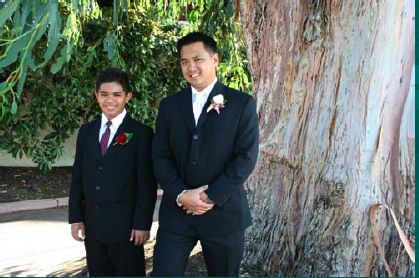
And that's where we are today in our plight for a resolution.
Recapping the frustrating experiences with dealing with trying to get help
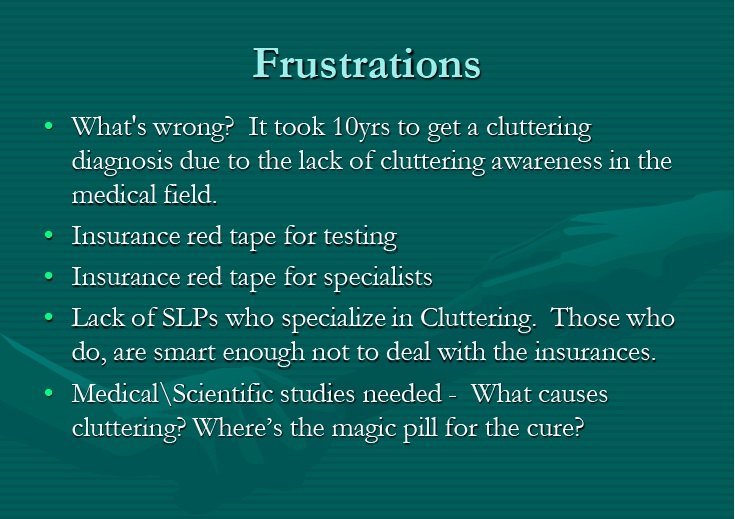
Some personal comments for SLPs
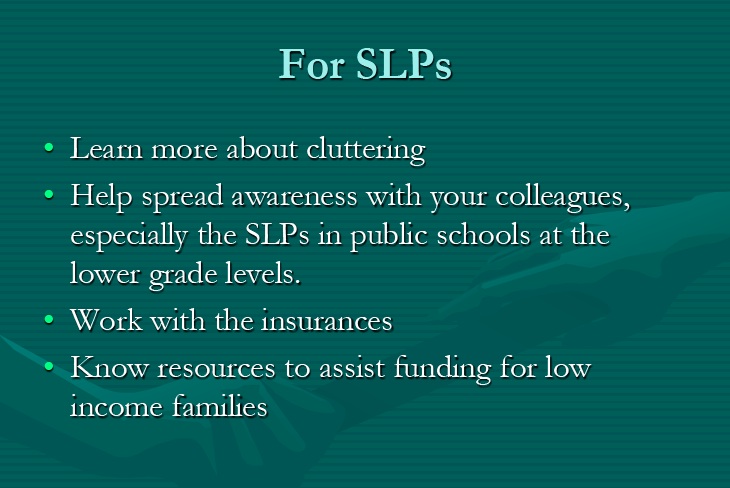
Some personal comments for the Parents.
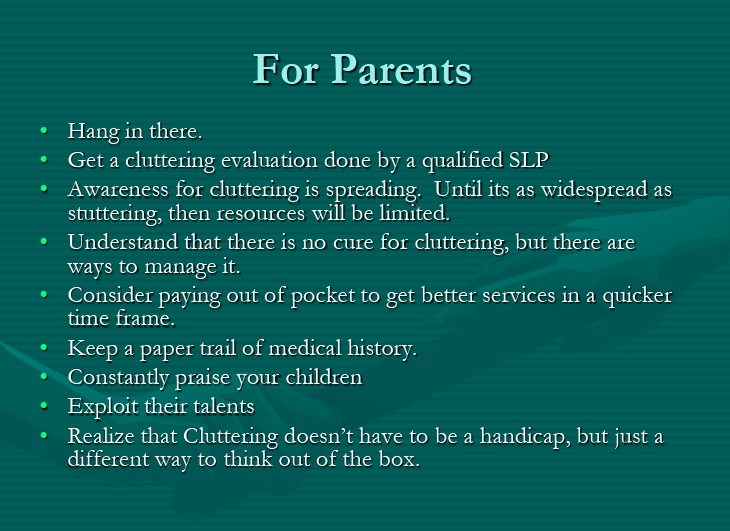
SUBMITTED: March 14, 2010

